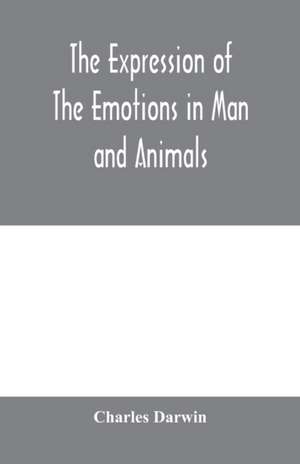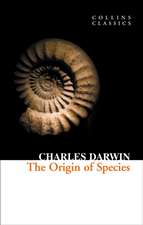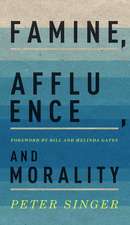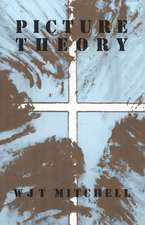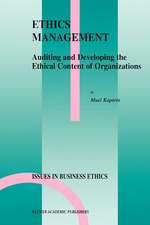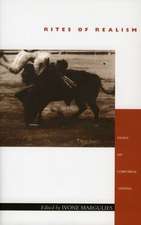The expression of the emotions in man and animals
Autor Charles Darwinen Limba Engleză Paperback – 18 feb 2020
Preț: 188.27 lei
Nou
Puncte Express: 282
Preț estimativ în valută:
36.03€ • 37.69$ • 29.93£
36.03€ • 37.69$ • 29.93£
Carte disponibilă
Livrare economică 12-26 martie
Preluare comenzi: 021 569.72.76
Specificații
ISBN-13: 9789354001024
ISBN-10: 9354001025
Pagini: 396
Dimensiuni: 140 x 216 x 24 mm
Greutate: 0.5 kg
Editura: Alpha Editions
ISBN-10: 9354001025
Pagini: 396
Dimensiuni: 140 x 216 x 24 mm
Greutate: 0.5 kg
Editura: Alpha Editions
Notă biografică
Charles Robert Darwin (1809-1882) was born in Shropshire, England. His first text chronicling his five-year voyage on the HMS Beagle, which included his notable visit to the Galapagos Islands, earned him success as an author in 1839. His observations from the Galapagos, alongside an interest in natural history from an early age and studies over the consequent years, informed the development of his biological theories, culminating the ground-breaking text 'On the Origin of Species' for which he is best known.
Cuprins
Preface by Konrad Lorenz
Introduction
1. General Principles of Expression
2. General Principles of Expression (continued)
3. General Principles of Expression (concluded)
4. Means of Expression in Animals
5. Special Expressions of Animals
6. Special Expressions of Man: Suffering and Weeping
7. Low Spirits, Anxiety, Grief, Dejection, Despair
8. Joy, High Spirits, Love, Tender Feelings, Devotion
9. Reflection, Meditation, Ill-Temper, Sulkiness, Determination
10. Hatred and Anger
11. Disdain, Contempt, Disgust, Guilt, Pride, Helplessness, Patience, Affirmation and Negation
12. Surprise, Astonishment, Fear, Horror
13. Self-Attention, Shame, Shyness, Modesty: Blushing
14. Concluding Remarks and Summary
Introduction
1. General Principles of Expression
2. General Principles of Expression (continued)
3. General Principles of Expression (concluded)
4. Means of Expression in Animals
5. Special Expressions of Animals
6. Special Expressions of Man: Suffering and Weeping
7. Low Spirits, Anxiety, Grief, Dejection, Despair
8. Joy, High Spirits, Love, Tender Feelings, Devotion
9. Reflection, Meditation, Ill-Temper, Sulkiness, Determination
10. Hatred and Anger
11. Disdain, Contempt, Disgust, Guilt, Pride, Helplessness, Patience, Affirmation and Negation
12. Surprise, Astonishment, Fear, Horror
13. Self-Attention, Shame, Shyness, Modesty: Blushing
14. Concluding Remarks and Summary
Descriere
Descriere de la o altă ediție sau format:
To mark the birthday of the world's most renowned evolutionary biologist, Oxford University Press has reissued the definitive edition of Darwin's classic-a brilliantly entertaining and accessible exploration of human and animal behavior. Renowned psychologist Paul Ekman's edited version of this book is the first to appear the way Darwin ultimately intended, with all of the corrections and additions that were in Darwin's notes for a revision that was never published during hislifetime. "Why do we shrug? Why do dogs wag their tails? Why do we scowl when angry and pout when sad rather than the other way around? What is the difference between guilt and shame? This would be an extraordinary book even if it had only answered these and scores of similar questions about the emotions in 1872 . . . Darwin enriched his arguments with hundreds of insightful observations, many with the pathos and humor of great literature, as when he describes the terror of a man being led to hisexecution or the comical dejection of his dog as soon as it sensed that a walk might end . . . This edition has the feel not of a lovingly restored museum piece but of a recent seminal work."--Steven Pinker, Science "Darwin's most readable and human book . . . undiminished and intensely relevant even 125 years after publication."--Oliver Sacks, author of Musicophilia and The Man Who Mistook His Wife for a Hat "The Expression of the Emotions predates Freud, and it will still be illuminating human psychology long after Freud's discrediting is complete."--Richard Dawkins, author of The God Delusion "Highly original . . . this is scholarship at its best."--Simon Baron-Cohen, Nature "Ekman's edition is no mere reprint plus introduction."--Mark Ridley, Scientific American
To mark the birthday of the world's most renowned evolutionary biologist, Oxford University Press has reissued the definitive edition of Darwin's classic-a brilliantly entertaining and accessible exploration of human and animal behavior. Renowned psychologist Paul Ekman's edited version of this book is the first to appear the way Darwin ultimately intended, with all of the corrections and additions that were in Darwin's notes for a revision that was never published during hislifetime. "Why do we shrug? Why do dogs wag their tails? Why do we scowl when angry and pout when sad rather than the other way around? What is the difference between guilt and shame? This would be an extraordinary book even if it had only answered these and scores of similar questions about the emotions in 1872 . . . Darwin enriched his arguments with hundreds of insightful observations, many with the pathos and humor of great literature, as when he describes the terror of a man being led to hisexecution or the comical dejection of his dog as soon as it sensed that a walk might end . . . This edition has the feel not of a lovingly restored museum piece but of a recent seminal work."--Steven Pinker, Science "Darwin's most readable and human book . . . undiminished and intensely relevant even 125 years after publication."--Oliver Sacks, author of Musicophilia and The Man Who Mistook His Wife for a Hat "The Expression of the Emotions predates Freud, and it will still be illuminating human psychology long after Freud's discrediting is complete."--Richard Dawkins, author of The God Delusion "Highly original . . . this is scholarship at its best."--Simon Baron-Cohen, Nature "Ekman's edition is no mere reprint plus introduction."--Mark Ridley, Scientific American
Recenzii
"The Expression of the Emotions predates Freud, and it will still be illuminating human psychology long after Freud's discrediting is complete."
--Richard Dawkins
"Highly original . . . this is scholarship at its best."
-Simon Baron-Cohen, Nature
"Ekman's edition is no mere reprint plus introduction."
-Mark Ridley, Scientific American
"Why do we shrug? Why do dogs wag their tails? Why do we scowl when angry and pout when sad rather than the other way around? What is the difference between guilt and shame? This would be an extraordinary book even if it had only answered these and scores of similar questions about the emotions in 1872. But Expression also proved that the human mind, not just the body, is a product of evolution. It showed, during the heyday of scientific racism, that the races of mankind arefundamentally similar; anticipating virtually every twentieth-century behavioral science . . . Darwin enriched his arguments with hundreds of insightful observations, many with the pathos and humor of great literature, as when he describes the terror of a man being led to his execution or the comicaldejection of his dog as soon as it sensed that a walk might end . . . This edition has the feel not of a lovingly restored museum piece but of a recent seminal work."
-Steven Pinker, Science
Darwin's most readable and human book . . . It was never republished in his lifetime, even though Darwin made many additions and revisions in the text. Only now have all of Darwin's changes been incorporated into the book, along with a full apparatus of notes and appendices and a number of photographs that never made it into the 1873 edition . . . This new comprehensive edition of Expression will introduce a new generation of readers to Darwin's masterpiece, undiminished andintensely relevant even 125 years after publication.
-Oliver Sacks
--Richard Dawkins
"Highly original . . . this is scholarship at its best."
-Simon Baron-Cohen, Nature
"Ekman's edition is no mere reprint plus introduction."
-Mark Ridley, Scientific American
"Why do we shrug? Why do dogs wag their tails? Why do we scowl when angry and pout when sad rather than the other way around? What is the difference between guilt and shame? This would be an extraordinary book even if it had only answered these and scores of similar questions about the emotions in 1872. But Expression also proved that the human mind, not just the body, is a product of evolution. It showed, during the heyday of scientific racism, that the races of mankind arefundamentally similar; anticipating virtually every twentieth-century behavioral science . . . Darwin enriched his arguments with hundreds of insightful observations, many with the pathos and humor of great literature, as when he describes the terror of a man being led to his execution or the comicaldejection of his dog as soon as it sensed that a walk might end . . . This edition has the feel not of a lovingly restored museum piece but of a recent seminal work."
-Steven Pinker, Science
Darwin's most readable and human book . . . It was never republished in his lifetime, even though Darwin made many additions and revisions in the text. Only now have all of Darwin's changes been incorporated into the book, along with a full apparatus of notes and appendices and a number of photographs that never made it into the 1873 edition . . . This new comprehensive edition of Expression will introduce a new generation of readers to Darwin's masterpiece, undiminished andintensely relevant even 125 years after publication.
-Oliver Sacks
